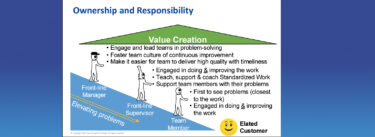Like most Americans, including those in the continuous improvement community, I am heartbroken about the horrific murder of George Floyd at the hands of police officers in Minnesota. It is clear to me that this is a watershed moment for lean leaders to stand up against racial inequity and racist policies. It is no longer satisfactory to say, “Well, I am not a racist, so there is no problem in my organization.”
Ibram X. Kendi, the author of How to be an Antiracist, argues it’s not enough to say you’re not a racist. This self-proclamation is problematic because it signifies neutrality; that is, “I am not a racist, but I am also not aggressively against racism either.” As individuals, we either allow racial inequities to continue or confront the underlying racist policies head-on. With that in mind, I am proud to see the Lean Enterprise Institute (LEI) lean in toward the direction of directly addressing racial inequities. In a recent newsletter, LEI reminded readers that Mr. Floyd is the latest victim of hundreds of years of racial oppression, aptly recognizing that his death is so egregious that we can no longer remain silent. I agree with LEI that we must find a way to dismantle racism once and for all. Doing so requires fundamental changes in our society — significant shifts in thinking across all industries, including law enforcement, healthcare, education, housing, manufacturing, and service, to name a few. Lean leaders have a crucial role to play. We have long practiced and taught clients Respect for People as the moral core of lean thinking. As LEI states, leading respectfully not only improves business results but also the lives of workers, their families, their community, and, ultimately, society.
The tragedy of George Floyd’s untimely murder informs us that there is still much work to do. This endeavor requires leaders to take the initiative and model appropriate next steps. In addition to decisive action and clear expectations, this will require self-reflection and, yes, vulnerability – a willingness to take risks and challenge the status quo.
Leaders will need to do some soul searching and become comfortable with being uncomfortable to unearth the inequalities in their organizations. In its self-reflection, LEI acknowledges the need to deepen their understanding of how they contribute to the problem of racism and pledges to change their individual and corporate behavior. I invite other industry leaders to do this type of courageous introspection.
Might I also recommend pulling the change management tool humble inquiry from your kaizen toolbox? According to Edgar Schein, humble inquiry “derives from an attitude of interest and curiosity. It implies a desire to build a relationship that will lead to more open communication. It also implies that one makes oneself vulnerable and, thereby, arouses positive helping behavior in the other person.”
Dan Markovitz, a LEI faculty member, reminds us that traditional hierarchical workplaces create unbalanced power dynamics that work against this kind of humble interaction. For example, nurses struggle to voice concerns about patient safety to physicians. Software engineers have a difficult time talking about coding problems to their project manager. First-year lawyers cringe at the thought of pushing back against the firm’s partners. And tragically, in Minnesota, rookie police officers did not intervene while a fellow senior police officer murdered an African-American citizen.
Markovitz advises us that effective humble inquiry requires that we consciously break down the hierarchical barriers in our organizations. But breaking these barriers becomes more arduous when we also are dealing with racism in the workplace — because racist practices are often not evident to those committing racist acts.
According to Dr. Robin DiAngelo, the author of White Fragility, most white people are uncomfortable talking about race and have a very limited minimal understanding of racism because they have not been trained to think about it in complex ways. Unfortunately, it benefits their self-interest not to do so. If racism operates in the background, then how we have always done things and the people who have always benefited get to continue without question. It seems natural.
Despite this lack of understanding, individuals and companies do not often seek out experts who have thought about race in a complex fashion; this needs to change. Dr. DiAngelo advises leaders not to be dismissive of these experts, but instead, to humbly acknowledge where they are unfamiliar, reflect further, and seek more information. This additional barrier, racial illiteracy, further prevents change agents from listening to or comprehending the perspectives of people of color and bridging cross-racial divides. Dr. DiAngelo asserts that the antidote to white fragility is on-going and life-long efforts. This work includes sustained engagement, humility, and education. She recommends beginning with:
- Being willing to tolerate the discomfort associated with an honest appraisal and discussion of internalized superiority and racial privilege
- Acknowledging a particular and limited perspective on race
- Attempting to understand people’s racial realities through authentic interaction rather than through the media or unequal relationships
- Taking action to address your own racism, the racism of others, and the racism embedded in your institutions
In this historic moment, I am reminded of what Governor Andrew Cuomo told New Yorkers during a press briefing in the face of another enormous crisis, the coronavirus outbreak. He essentially told them it would get better because they were strong, smart, resourceful, united, and tough. That also describes many of the lean thinkers I know from my continuous improvement journeys. Each of us has to answer to ourselves: On which side of history will I stand? What will I do?
Lean thinkers: We have plenty of experience using humble inquiry and other problem-solving tools to root-out non-valued-activities in our organizations. Now we need to add racism to the list of wastes to eradicate in our never-ending pursuit for perfection. Like LEI, I am committed to taking what I know about solving problems and applying it with vigor to the task at hand. Thank you, LEI, for leading by example, taking a moral stand, donating to a local social injustice organization, and committing to do more in the future. I hope all my brothers and sisters in the continuous improvement community will join us in this endeavor.
References:
- Dan Markovitz, How NOT to Jump to Solutions When Facing A Problem, The Lean Post, June 4, 2020.
- Ibram X. Kendi, How to be an Antiracist, Penguin Random House LLC, 2019.
- Dr. Robin DiAngelo, White Fragility: Why It’s So Hard to Talk to White People About Racism, Beacon Press, 2018.





